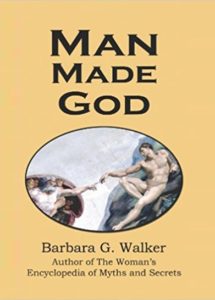Recommended Humanist Reading: Barbara G. Walker’s Man Made God

Life is short and books are plenty. We humanists, being avid readers, know well the frustration of not having the time to read every book that interests us. Now that I’ve turned eighty-four and am “pretty much” retired, I’ve been spending much of my time catching up on my reading. I’m pleased to begin occasionally sharing with TheHumanist.com readers my brief reviews of humanist books you may have missed.
Man Made God by Barbara G. Walker
(Stellar House Publishing: Seattle, 2010)
Man Made God is a series of articles and essays by the author of The Woman’s Encyclopedia of Myths and Secrets. As the book’s back cover notes, “Barbara G. Walker takes us through a riveting journey back in time to when the Goddess and her consort/son ruled supreme, into the era when the patriarchy usurped her worship, right up to Barbara’s own personal experience being raised a Christian.”
Walker studied journalism at the University of Pennsylvania and later worked for the Washington Star newspaper in Washington, DC. While serving on a local hotline helping battered women and pregnant teens in the mid-1970s, she became interested in feminism. She continued a personal study of comparative religions and feminist issues that led to her writing The Woman’s Encyclopedia in 1983.
Walker describes herself as an atheist. The American Humanist Association named her “Humanist Heroine” in 1993 and in 1995 she received the “Women Making Herstory” award from the National Organization for Women of New Jersey.
The essays in Man Made God deal with the nature and history of religion and mythology specifically from the female perspective. The collection includes such topics as religion as a big business, its effects on children, church history relating to the Dark Ages, book-burning and witch-burning, Christian origins and afterlife traditions, and much more. With regard to Christian origins, many if not most of them come from “ancient pagan traditions,” a connection Walker repeatedly points out.
Regarding a skeptic’s idea of a proper religion, Walker writes of “one that honors life, encourages love, and actually practices the Golden Rule instead of giving lip service while practicing the opposite. When communal rituals are devised that perpetuate this kind of morality, then I will attend their ‘religious’ services.”
On God, Walker enjoins: “Tell me what your God is, and I will tell you what you are…God is mostly the collective dream of male human beings as they would like to see themselves: all-powerful, invincible, having his own way in everything.”
Indeed, Man Made God is replete with many beautifully written and highly quotable passages— so many that much of my book is underlined. I could never resell it now, nor would I ever want to! I’ll close with one final example of Walker’s engaging style:
Only when truth is no longer confused with mythology; only when transcendent rewards or punishments are no longer postulated in an afterlife; only when people judge other people by their actions rather than by their beliefs—or lack of beliefs—only then might it be possible for the concept of absolute evil to wither away, to be replaced by a new ethic of kindness and tolerance. Will it happen, sooner or later? Will it ever happen? What do you think?
